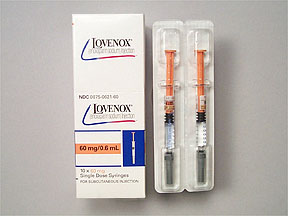Lovenox Side Effects
Lovenox may cause side effects. Tell your doctor if any of these symptoms are severe or do not go away:
- upset stomach
- fever
- burning or irritation at the site of injection
There may be more serious adverse effects of Lovenox:
- unusual bleeding or bruising
- black or bloody stools
- blood in urine
- swollen ankles and/or feet
- numbness
- tingling
- leg weakness
Patients taking Lovenox who’ve experienced spinal injuries are at risk of paralysis.
Warnings & Recalls for Lovenox
Before taking Lovenox,
- Be sure to tell your doctor or pharmacist if you are allergic to enoxaparin, heparin, any other drugs, or pork products.
- Be sure to tell your doctor and pharmacist what prescription and nonprescription medications you are taking and vitamins.
- Tell your doctor if you have an artificial heart valve and if you have or if you’ve ever had kidney disease, any sort of infection in your heart, a stroke, a bleeding disorder, ulcers, or a low platelet count.
- Tell your doctor if you are pregnant, plan to become pregnant, or are nursing. If you become pregnant while taking Lovenox, call your doctor.
- If you’re having surgery, including dental surgery, tell the doctor or dentist that you are taking Lovenox.
If you have epidural or spinal anesthesia or a spinal puncture while taking a ''blood thinner'' such as Lovenox, you are at risk for paralysis. Tell your doctor if you are taking other such as warfarin, abciximab, anagrelide, aspirin or NSAIDs (ibuprofen, naproxen), cilostazol, clopidogrel, dipyridamole, eptifibatide, sulfinpyrazone, ticlopidine, and tirofiban.
If you experience any of the following symptoms, call your doctor immediately:
- Numbness
- Tingling
- leg weakness
- Paralysis
- Loss of control over your bladder or bowels
Although there hasn’t been a total recall by the FDA regarding Lovenox, the FDA had issued a recall of certain batches of Lovenox in September of 2011 that they had believed had alcohol prep pads that were contaminated.
Lovenox Treatment and Use
 Lovenox | Enoxaparin Sodium is a drug that’s marketed by Sanofi and is derived from the intestinal mucosa of pigs. Its an anticoagulant that’s used to treat and prevent deep vein thrombosis or pulmonary embolism that’s given as an injection. Its also used to prevent blood clots in a patient’s legs in combination with warfarin who’re at bedrest or who might be having hip or knee replacement or stomach surgery. It can be concurrently used with aspirin to prevent complications from angina and heart attacks. Its drug classification is that of a low molecular weight heparin and its use is evolving in the treatment of ACS or acute coronary syndromes. Annual sales of this drug usually accumulates up to $3.1 billion.
Lovenox | Enoxaparin Sodium is a drug that’s marketed by Sanofi and is derived from the intestinal mucosa of pigs. Its an anticoagulant that’s used to treat and prevent deep vein thrombosis or pulmonary embolism that’s given as an injection. Its also used to prevent blood clots in a patient’s legs in combination with warfarin who’re at bedrest or who might be having hip or knee replacement or stomach surgery. It can be concurrently used with aspirin to prevent complications from angina and heart attacks. Its drug classification is that of a low molecular weight heparin and its use is evolving in the treatment of ACS or acute coronary syndromes. Annual sales of this drug usually accumulates up to $3.1 billion.
It is usually given twice a day at a hospital or clinical setting.
Indications
- treatment of unstable angina (UA) and non-Q-wave myocardial infarction, administered concurrently with aspirin
- prophylaxis of Deep Vein Thrombosis
- total hip and knee replacement
- abdominal surgery
- treatment of deep vein thrombosis with or without PE
- treatment of deep vein thrombosis inpatient, with Ambulatory Care Sensitive Conditions, including ST-Segment Elevation Myocardial Infarction.
Other Names for Lovenox
Enoxaparin Sodium Injection
Lawsuits & Legal Information for Lovenox
Author:
Lainee Hooks
Posted on May 21, 2012